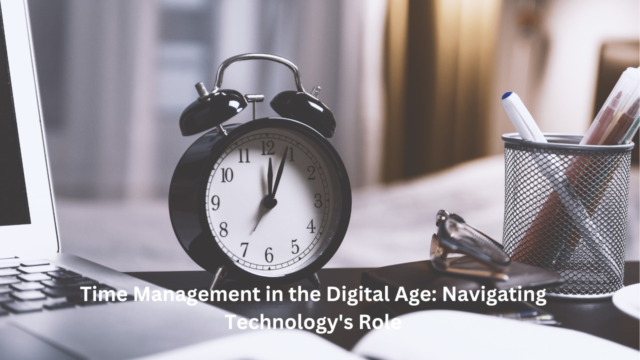In the digital age, technology has become an integral part of our lives, both personally and professionally. While it offers numerous benefits, it also poses challenges to effective time management. This article delves into the complexities of time management in the digital era and provides strategies to navigate technology’s role for improved productivity.
The Impact of Technology on Time Management
Technology has reshaped the way we work and live, impacting time management in various ways:
Digital Distractions: Constant notifications, emails, and social media can be major distractions, diverting our attention from important tasks.
Information Overload: The internet provides an overwhelming amount of information. Sorting through this data can be time-consuming and overwhelming.
Remote Work: The rise of remote work and digital communication tools has blurred the boundaries between work and personal life, making it challenging to manage time effectively.
Increased Efficiency: On the flip side, technology can automate tasks, streamline processes, and enhance productivity if used effectively.
Strategies for Effective Time Management in the Digital Age
Set Technology Boundaries:
Digital Detox: Schedule regular digital detoxes where you disconnect from devices and focus on other activities.
Turn Off Notifications: Disable non-essential notifications to reduce interruptions and stay focused during work hours.
Use Technology Wisely:
Productivity Apps: Explore productivity apps and tools that can help you manage tasks, deadlines, and schedules.
Time Tracking: Use time tracking apps to monitor how you spend your digital time and identify areas for improvement.
Practice Email Management:
Inbox Zero: Adopt the Inbox Zero approach, where you aim to keep your email inbox empty or well-organized.
Set Specific Email Times: Schedule specific times to check and respond to emails rather than constantly checking throughout the day.
Time Blocking:
Digital Time Blocks: Allocate specific blocks of time for digital tasks, such as checking emails or attending virtual meetings.
Analog Time Blocks: Dedicate time blocks for offline, focused work to balance digital activities.
Prioritize Information:
Filter Information: Use tools like email filters and news aggregators to prioritize and organize the information you receive.
Limit Social Media: Set boundaries on social media use, reserving it for specific times or purposes.
Set Clear Goals:
Digital Goals: Define specific digital goals and objectives that align with your overall goals.
Goal-Oriented Digital Activities: Ensure that your digital activities contribute directly to achieving your goals.
Establish Digital-Free Zones:
Bedroom and Dining Areas: Keep technology out of the bedroom and dining areas to promote relaxation and quality time with loved ones.
Meeting Etiquette: Encourage digital-free meetings to enhance focus and engagement.
Continuous Learning:
Digital Literacy: Stay informed about digital tools and best practices for managing technology to stay productive.
Adaptation: Be open to adapting your strategies as technology evolves.
Delegate Tasks:
Virtual Assistants: Consider outsourcing tasks to virtual assistants or automated tools to free up your time for more strategic activities.
Mindfulness and Balance:
Mindful Digital Use: Practice mindfulness when using digital devices, ensuring that your use aligns with your intentions.
Balanced Lifestyle: Strive for a balanced lifestyle by allocating time to offline activities, hobbies, and social connections.
Conclusion
Managing time effectively in the digital age requires conscious effort and adaptability. By setting boundaries, using technology wisely, and aligning your digital activities with your goals, you can harness the benefits of technology while mitigating its potential drawbacks. Remember that the key to effective time management in the digital era is finding a balance that suits your unique needs and goals.







